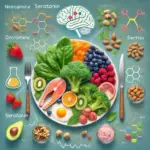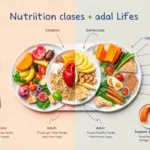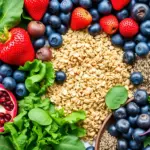Proper nutrition during pregnancy is essential for the health of both the mother and the developing fetus. A well-balanced diet not only supports the mother’s bodily changes but also significantly influences pregnancy outcomes, such as fetal growth and development. In this article, we will explore the nutritional needs during pregnancy, highlight healthy foods to include in your diet, discuss hydration, identify foods to avoid, and provide strategies for managing cravings and aversions. By understanding these aspects, you can make informed choices that promote a healthy pregnancy and ensure the best possible start for your baby.
Nutritional Needs During Pregnancy
Increased Caloric Intake
During pregnancy, a woman’s caloric needs increase to support the growth and development of the fetus. In the first trimester, the increase might be minimal, but by the second and third trimesters, women typically require an additional 300 to 500 calories per day. It’s crucial to derive these extra calories from nutrient-dense foods rather than empty-calorie options. This means focusing on whole foods that provide vitamins, minerals, and other essential nutrients.
Essential Nutrients
Several key nutrients are crucial for a healthy pregnancy:
- Folic Acid: Vital for fetal brain and spinal cord development. Sources include leafy greens, beans, and fortified cereals.
- Iron: Necessary to support increased blood volume and fetal growth. Good sources are lean meats, spinach, and legumes.
- Calcium: Important for building the baby’s bones and teeth. Dairy products, fortified plant milk, and leafy greens are excellent choices.
- DHA (Docosahexaenoic Acid): A type of omega-3 fatty acid needed for brain development, found in fatty fish and algae supplements.
Ensuring adequate intake of these nutrients can significantly influence pregnancy outcomes and fetal health.
Healthy Foods to Include in Your Diet
Fruits and Vegetables
A diverse range of colorful fruits and vegetables is crucial during pregnancy. They provide essential vitamins, minerals, and antioxidants that support both maternal health and fetal development.
- Spinach: High in folate, important for reducing the risk of neural tube defects.
- Berries: Packed with antioxidants and vitamins, these can help combat inflammation and provide necessary nutrients.
Whole Grains
Incorporating whole grains into your diet offers significant benefits for both energy and digestive health.
- Brown Rice: A great source of fiber and essential amino acids.
- Quinoa: Loaded with protein and providing all nine essential amino acids, perfect for supporting the growing fetus.
- Whole-Wheat Bread: A healthier alternative to refined bread options, rich in nutrients.
Protein Sources
Adequate protein intake is vital for fetal growth and development. Aim to include a variety of these sources in your meals.
- Lean Meats: Chicken and turkey provide high-quality protein and essential nutrients like iron.
- Beans: A plant-based protein rich in fiber and vital nutrients to support digestion and overall health.
- Nuts: Almonds and walnuts provide healthy fats and protein.
- Dairy: Opt for low-fat options for calcium and vitamin D.
Healthy Fats
Healthy fats play a crucial role in fetal brain development and overall health during pregnancy.
- Omega-3 Fatty Acids: Found in oily fish like salmon, these are essential for brain development.
- Avocado: A rich source of healthy monounsaturated fats, fiber, and potassium, promoting overall health.
By incorporating these healthy foods into your diet, you can create a well-balanced nutrition plan that supports your pregnancy.
Hydration and Pregnancy
Importance of Staying Hydrated
Proper hydration is essential during pregnancy as it supports various bodily functions and helps alleviate common discomforts, such as fatigue and swelling. The recommended daily water intake for pregnant women is around 10 cups, or 2.3 liters, which can vary based on individual health and activity levels. Adequate hydration can also help prevent urinary tract infections and ensure healthy amniotic fluid levels.
Healthy Beverage Options
Choosing the right beverages is crucial for maintaining hydration. Water is always the best choice. Herbal teas, such as ginger or peppermint, can also be beneficial—but it’s important to confirm their safety with a healthcare provider. Additionally, foods with high water content, such as cucumbers, oranges, and watermelon, can contribute to overall hydration while providing essential nutrients.
Foods to Avoid During Pregnancy
High-Mercury Fish
Pregnant women are advised to avoid certain types of fish that are high in mercury, which can harm fetal development. Fish such as shark, swordfish, king mackerel, and tilefish should be eliminated from the diet. Instead, opt for safer fish options like salmon, shrimp, and sardines, which are low in mercury and can be enjoyed in moderation. It’s generally recommended to limit fish consumption to about 2-3 servings per week to reduce mercury exposure.
Processed Foods and Sugars
Excessive consumption of processed foods and added sugars can lead to gestational diabetes, excessive weight gain, and other complications. Pregnant women should be mindful of their sugar intake and focus on whole, nutrient-dense foods. Healthier alternatives include fresh fruits as sweet snacks, homemade meals using whole ingredients, and natural sweeteners like honey or maple syrup, in moderation.
Alcohol and Caffeine
Alcohol consumption during pregnancy can lead to fetal alcohol spectrum disorders, which can have lifelong effects on the child. Therefore, abstaining from alcohol is crucial for expectant mothers. Caffeine, on the other hand, should also be limited due to its potential link to miscarriage and low birth weight. The general recommendation is to keep caffeine intake under 200 mg per day, which is roughly equivalent to one 12-ounce cup of coffee. Healthier substitutes for caffeinated beverages include herbal teas and decaffeinated drinks.
Managing Food Cravings and Aversions
Understanding Pregnancy Cravings
Pregnancy cravings are a common phenomenon that many expectant mothers experience. Hormonal changes and increased energy needs can drive these cravings, which may include a desire for specific flavors or textures. It’s essential to understand that cravings can vary widely among individuals.
- Common Cravings: Some typical cravings include sweet foods, salty snacks, and dairy products.
- Indulging in Moderation: While it’s okay to indulge in cravings occasionally, it’s vital to do so in moderation to maintain a balanced diet. Consider healthier versions of your cravings, like opting for fruit instead of sugary snacks.
Dealing with Food Aversions
Food aversions are equally prevalent during pregnancy and can make it challenging to maintain a nutritious diet. Many women find that certain foods they once enjoyed become unappetizing.
- Strategies for Managing Aversions: Focus on incorporating alternative foods that provide similar nutritional benefits. If you find yourself averse to meats, try legumes and nuts for protein.
- Gradual Reintroduction: Consider gradually reintroducing aversive foods when the nausea subsides or when you feel ready. This may help restore tolerance and variety in your diet, fostering a more balanced intake of essential nutrients.
Nutritional Supplements During Pregnancy
When to Consider Supplements
- Supplementation may be necessary for certain individuals, particularly those following vegan diets, experiencing previous nutrient deficiencies, or facing increased nutritional demands. Consulting with a healthcare provider can help identify specific needs based on dietary habits and health status.
Types of Recommended Supplements
-
Prenatal Vitamins: Prenatal vitamins are specifically designed to provide essential nutrients needed during pregnancy. Key components include:
- Folic Acid: Crucial for preventing neural tube defects and should ideally be taken before conception and throughout pregnancy.
- Iron: Important for increasing blood volume and preventing anemia.
- Calcium: Essential for developing the baby’s bones and teeth.
- DHA: An omega-3 fatty acid important for fetal brain and eye development.
-
Always consult with a healthcare provider regarding the necessity and appropriate dosage of any supplement to ensure it complements your diet and individual health needs.
Consulting Healthcare Providers
Importance of Professional Guidance
Proper nutrition during pregnancy is crucial for both the mother’s health and the developing fetus. Consulting with healthcare providers—such as obstetricians, dietitians, and nutritionists—plays a vital role in ensuring that pregnant individuals receive tailored advice specific to their health needs. These professionals can help identify personal dietary requirements and any adjustments that may be necessary as the pregnancy progresses.
Creating a Personalized Nutrition Plan
Every pregnancy is unique, and so are the nutritional needs that come with it. Healthcare providers can assist in creating a personalized nutrition plan that considers individual health conditions, lifestyle factors, and food preferences. This customized approach helps ensure that both the mother and the baby receive proper nutrition for safe and healthy growth throughout the pregnancy journey.
In this article, we explored the critical role of proper nutrition during pregnancy, emphasizing the importance of a balanced diet tailored to the needs of both the mother and the developing fetus. We discussed the increased caloric intake required throughout pregnancy, highlighted essential nutrients like folic acid, iron, and calcium, and provided suggestions for healthy foods to incorporate, including fruits, vegetables, whole grains, and protein sources. We also underscored the importance of hydration and discussed foods and drinks to avoid, particularly those high in mercury, processed sugars, alcohol, and caffeine. Additionally, we addressed managing cravings and aversions, the role of nutritional supplements, and the necessity of consulting healthcare providers for personalized dietary guidance.
As you navigate your pregnancy journey, remember that proper nutrition is paramount for both your health and your baby’s development. We encourage you to maintain a well-balanced diet, make informed food choices, and foster open communication with your healthcare professionals. If you have any questions or experiences to share about nutrition during pregnancy, please leave your comments below. For more in-depth information on this topic, check out our related articles on maternal health. Don’t forget to subscribe to our newsletter for ongoing tips and resources. We hope this article has been beneficial, and we look forward to engaging with you!









